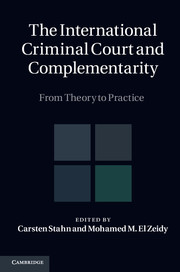Book contents
- Frontmatter
- Contents
- Acknowledgments
- Foreword by HE Judge Sang-Hyun Song
- Foreword by Patricia O’Brien
- Foreword by Silvia A. Fernandez de Gurmendi
- List of abbreviations
- Introduction: bridge over troubled waters?
- PART I General reflections
- PART II Origin and genesis of complementarity
- PART III Analytical dimensions of complementarity
- PART IV Interpretation and application
- PART IV (Continued) Interpretation and application
- PART V Complementarity in perspective
- PART VI Complementarity in practice
- 31 Making complementarity work: maximizing the limited role of the Prosecutor
- 32 Positive complementarity in action
- 33 Complementarity and the construction of national ability
- 34 The Colombian peace process (Law 975 of 2005) and the ICC’s principle of complementarity
- 35 Darfur: complementarity as the drafters intended?
- 36 Complementarity in Uganda: domestic diversity or international imposition?
- 37 Courts, conflict and complementarity in Uganda
- 38 Chasing cases: the ICC and the politics of state referral in the Democratic Republic of the Congo and Uganda
- 39 A problem, not a solution: complementarity in the Central African Republic and Democratic Republic of the Congo
- 40 Complementarity and the impact of the Rome Statute and the International Criminal Court in Kenya
- Index
- References
34 - The Colombian peace process (Law 975 of 2005) and the ICC’s principle of complementarity
from PART VI - Complementarity in practice
Published online by Cambridge University Press: 05 November 2014
- Frontmatter
- Contents
- Acknowledgments
- Foreword by HE Judge Sang-Hyun Song
- Foreword by Patricia O’Brien
- Foreword by Silvia A. Fernandez de Gurmendi
- List of abbreviations
- Introduction: bridge over troubled waters?
- PART I General reflections
- PART II Origin and genesis of complementarity
- PART III Analytical dimensions of complementarity
- PART IV Interpretation and application
- PART IV (Continued) Interpretation and application
- PART V Complementarity in perspective
- PART VI Complementarity in practice
- 31 Making complementarity work: maximizing the limited role of the Prosecutor
- 32 Positive complementarity in action
- 33 Complementarity and the construction of national ability
- 34 The Colombian peace process (Law 975 of 2005) and the ICC’s principle of complementarity
- 35 Darfur: complementarity as the drafters intended?
- 36 Complementarity in Uganda: domestic diversity or international imposition?
- 37 Courts, conflict and complementarity in Uganda
- 38 Chasing cases: the ICC and the politics of state referral in the Democratic Republic of the Congo and Uganda
- 39 A problem, not a solution: complementarity in the Central African Republic and Democratic Republic of the Congo
- 40 Complementarity and the impact of the Rome Statute and the International Criminal Court in Kenya
- Index
- References
Summary
This chapter assesses the Colombian peace process, as regulated by Law 975 of 2005 (Ley de Justicia y Paz), against Colombia's obligations under Article 17 of the Rome Statute. After some preliminary remarks (Section 1), it gives an overview of the process under Law 975, taking into account not only the relevant norms, but, especially, the practice (Section 2). In the third section, the complementarity test of Article 17 of the Rome Statute is systematically analysed and applied to the Colombian situation (Section 3). First, the object of reference of this test, in particular the distinction between situation and case, will be examined. Then, the actual complementarity test will be analysed – distinguishing between complementarity stricto sensu on the one hand and an additional gravity threshold on the other.
Preliminary remarks
The so-called ‘Justice and Peace Law’ (Ley de Justicia y Paz) of 25 July 2005 (‘Law 975’) continues a Colombian policy of restorative justice which goes back to the 1980s and pursues the objective of disarming, demobilizing and reintegrating irregular armed groups (‘Grupos Armados Organizados al Margen de la Ley’, i.e. ‘groups operating outside the law’, ‘GAOML’). While the earlier peace processes only referred to ‘left-wing’ insurgents, Law 975 also, or even predominantly, covers ‘right-wing’ paramilitary groups. The Law provides, as the central concession to the irregular groups, for a conversion of the ‘normal’ punishment into a so-called ‘alternative sentence’ (‘pena alternativa’) of a minimum of five and a maximum of eight years for the crimes committed during membership of the irregular group (Articles 3, 29). Thus, while Law 975 does not offer a full exemption from punishment, its mitigation is considerable compared with the normal punishment for these kind of crimes under the ordinary Colombian criminal law. Clearly, this considerable mitigation requires something in return from the potential beneficiary and that is his contribution to ‘truth, justice and reparation’ (Article 1), in particular by providing full information about the crimes committed by him and/or his group (Article 3). The Constitutional Court has reinforced this obligation. Against this background Law 975 can be qualified as a law of a conditionally reduced penalty.
- Type
- Chapter
- Information
- The International Criminal Court and ComplementarityFrom Theory to Practice, pp. 1071 - 1096Publisher: Cambridge University PressPrint publication year: 2011



